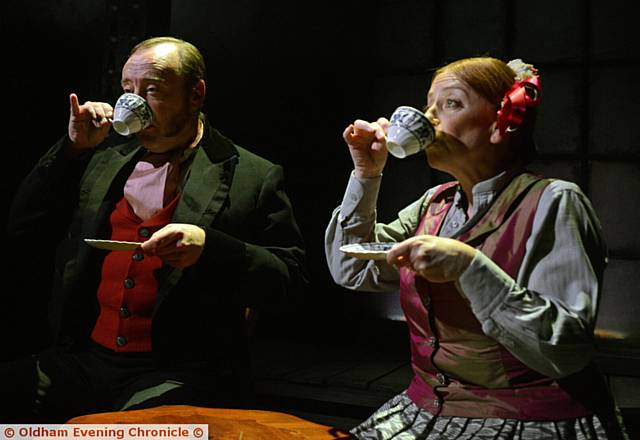Adaptation of classic tale
Reporter: Richard Hooton
Date published: 22 May 2017

TAKING TEA . . . William Travis and Isabel Ford in 'Hard Times'.
HARD TIMES
Oldham Coliseum Theatre (until Saturday, June 3)
HARD Times - something Oldham's had its fair share of.
Fat cat bosses, deprived workers on low pay, educational turmoil - are these the problems of the Victorian age or the modern day?
Theatre loves a bit of history repeating, often to highlight humanity's failure to learn its lessons, and this adaptation of Charles Dickens' classic parallels past and present, particularly class divides.
The hard-working cast are certainly on double time with seven actors tackling 19 roles. They slip seamlessly between characters to show off their full range of skills and accents.
Cliff Burnett is suitably aloof as fact-obsessed schoolmaster Thomas Gradgrind - the Rafa Benitez of the classroom - but with enough warmth to make his later conversion believable.
And William Travis channels his inner Mike Ashley, or Philip Green if you will, as the bullying mill owner Josiah Bounderby, who's supposedly dragged himself from the gutter to riches. Tom Michael Blyth is also excellent as the downtrodden but principled mill worker Stephen Blackpool, the beating heart and tragedy of the tale.
Set in the fictional Northern Coketown, Hard Times chronicles the struggles of the Industrial Revolution as Gradgrind drums facts into his pupils while starving them of imagination and Bounderby strives to reach society's peak regardless of the cost to others.
Atmosphere
The set is suitably industrial: imprisoning the actors inside the metal structures and grimy windows of the gloomy mill.
And it opens engagingly as a folk song led by Mr Burnett on fiddle morphs into the mechanical clangings of the mill's workers. There are other nice touches, like the versatile Mr Burnett's off-stage piano playing that adds a poignant atmosphere to scenes.
Trouble at t' mill though is it ain't that gripping and too much narration, with characters informing the audience as to what's happening, presumably to speed through the wordy text and connect the telling of the book to the present day, has the counter effect of deadening the drama. More show, less tell, is needed.
More fun and colour from Mr Sleary's travelling circus in the first half would also be welcome to counter the drudgery of the dark mill.
The second half is better thanks to an injection of intrigue and humour; a romantic affair, bank robbery, union feuds and mysterious characters bring drama, while Isabel Ford's scheming Mrs Sparsit adds much-needed comedy.
It's at its best in the quieter moments when the quality of the acting helps the humanity break from the chains: the broken Stephen's quiet dignity or when Louisa Bounderby, a moving portrayal from Verity Henry, is welcomed back home by her chastened father.
Dickens' fans will love seeing their favourite characters expertly brought to life; but just as Gradgrind learns, more joy and colour would sweeten our lesson.
Most Viewed News Stories
- 1Milan Bar in Lees and The Bank at Delph close doors with immediate effect
- 2Latics announce retained list
- 3Punch perfect Kyle is Oldham's latest national boxing champ
- 4Attack on shop worker filmed and posted on Snapchat results in jail sentence for Oldham man
- 5Second-hand music, books and media shop opens in Mossley




